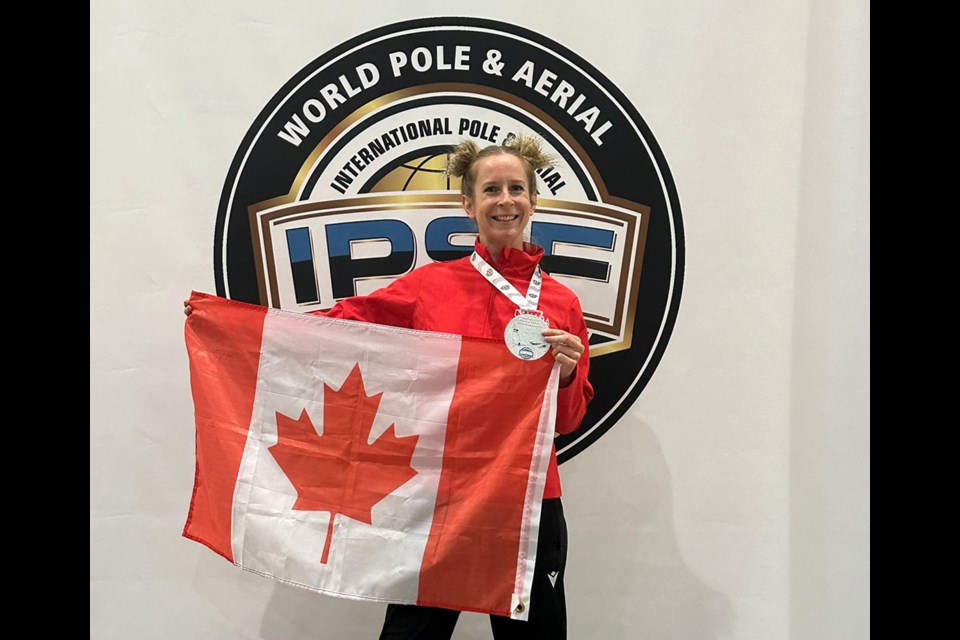A Terry Fox Secondary grad is spinning her way towards the top of the competitive pole dancing world.
Rosanne Marshall, who grew up in Port Coquitlam's north side but now lives in Verona, Italy, recently finished second in the artistic pole competition at the International Pole Sport Federation's world championships in Kielce, Poland.
Marshall, 37, said she didn't discover pole dancing until she moved to Italy with her husband, who's originally from Verona. But the foundation for her success in the sport was formed through many years of Irish dance, jazz, modern and hip hop lessons when she was growing up in PoCo.
Marshall said her ardour for her new passion was immediate.
"I knew I absolutely needed to do a lesson," she said of pole dancing, adding its tawdry association with dark bars and strippers never gave her pause.
In fact, in Italy, the sport is called "lap dancing," which brings up a whole other set of salacious connotations.
Mostly, Marshall said, people are curious about the sport, and its practitioners are wildly enthusiastic about the discipline, fitness, strength and flexibility it requires.
"There are many different aspects to this one sport," she said.
"Watching videos of anybody at any level online, they all make it look easy to an outsider or a beginner, and then you try it and it's a completely different story."
A year after Marshall started spinning around a pole, she won her first competition, at the Arnold Classic in Barcelona, Spain — an annual festival of fitness, strength, agility and bodybuilding sports that's sponsored by Arnold Schwarzenegger.
The success spurred Marshall to up her commitment to the sport. She earned her teaching qualifications and began guiding other recreational and competitive pole dancers at a studio in Verona while still working on her own routines two hours a day, four to five days a week, in addition to cardio and endurance training.
Marshall said competitive pole dancing is similar to gymnastics where some athletes gravitate to its artistic elements while others excel at its physical challenges that require flawless execution of compulsory moves to demonstrate their strength and agility.
"Artistic pole is completely different," Marshall said of her preferred discipline.
"It is completely free of any obligation to tricks and concentrates more on the creativity, character and storytelling."
Marshall said a winning three- to four-minute routine in artistic pole requires imaginative choreography, a clear story and even the good use of props to win over the judges. Self-confidence and fully enjoying the moment also don’t hurt.
Marshall said while she made errors during her routine at the worlds in Poland, that she performed to Fleetwood Mac's "Tusk," they were tiny slips only she would notice.
"I just had a lot of fun with it."
Clearly the judges enjoyed it as well, as Marshall's score elevated her to second place from the 16th overall ranking in the world she'd earned from her results in qualifying events heading into the competition.
Marshall said pole dancing's relative novelty compared to more established artistic sports like gymnastics and figure skating means the sport is still trying to find its organizational legs.
There's still no universal set of rules and competition standards vary from country to country. Even venues can range from dim, dingy theatres to sprawling sports arenas or convention centres with multiple stages and professional lighting.
In Kielce, the 500 athletes were marched in by their country during a rousing opening ceremony and multiple stages allowed the competition to proceed non-stop as one pole could be prepared for the next competitor while another was being used.
"It's really a great time," Marshall said adding she'll spend the next while recharging, working with her students and looking for the music that will inspire her creativity to begin constructing her next routine.
"I never really plan ahead," she said. "I have to wait and see when an idea comes to me."



